June 13, 2025 | 23:28 GMT +7
June 13, 2025 | 23:28 GMT +7
Hotline: 0913.378.918
June 13, 2025 | 23:28 GMT +7
Hotline: 0913.378.918
In recent years, tourism in Mu Cang Chai has seen remarkable growth, unlocking potential and making it one of the most attractive destinations in the Northwest region. Known not only for its magnificent mountains, mysterious forests, and surreal terraced fields that captivate visitors, this land also boasts a rich cultural heritage and unique ethnic identities for travelers to experience and explore.
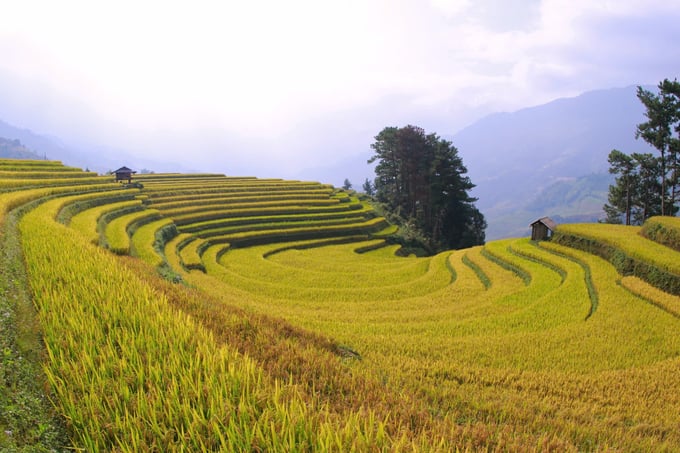
Mu Cang Chai will become a national tourist site in 2030. Photo: Thanh Tien.
At any time of the year, visitors to Mu Cang Chai can immerse themselves in the pristine, majestic nature, enjoy the fresh and cool climate that is unique to this place. Additionally, visitors have the opportunity to participate in the various stages of rice cultivation, from soil preparation, plowing, seedling planting, weeding, to the harvest on the iconic terraced fields.
Visitors can also experience community cultural activities tied to wet rice agriculture, such as the Long Tong festival, harvest ceremonies, new rice celebrations, and participate in traditional cultural activities like tossing cloth balls, spinning tops, dancing with khèn flutes, scarf dancing, and various ethnic sports, folk arts, and games. Additionally, the area still preserves many seasonal festivals such as the sticky rice pounding festival, the water pouring season festival, Independence Day, the Son Tra festival, the golden season festival, and the peach blossom festival.
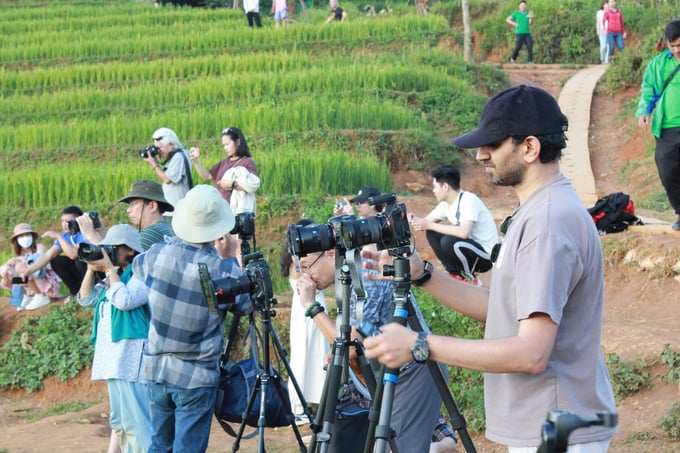
Each season offers its own beauty in Mu Cang Chai, along with a wealth of culture for tourists to explore. Photo: Thanh Tien.
Tourists can also join tours to view the terraced fields, visit waterfalls like Bay Tang, Mo, Rong, and bamboo forests in Mo De and Pung Luong, or even climb the 2,913-meter Lung Cung peak and the over 1,500-meter Ta Kay Dang peak. Throughout these journeys, visitors also have the chance to discover the traditional cultures of the Hmong and Thai ethnic groups through community-based tourism.
Mu Cang Chai aims to make tourism a vital economic sector by 2025, offering high-quality, distinctive, and appealing tourism products while promoting environmental conservation. The target is to attract over 350,000 tourists, including around 60,000 international visitors, generating more than VND 400 billion in tourism revenue.
By 2030, the goal is for Mu Cang Chai to be recognized as a National tourism site according to Decision No. 509 dated June 13, 2024, by the Prime Minister, attracting between 600,000 to 1 million visitors, with international tourists making up 30%.
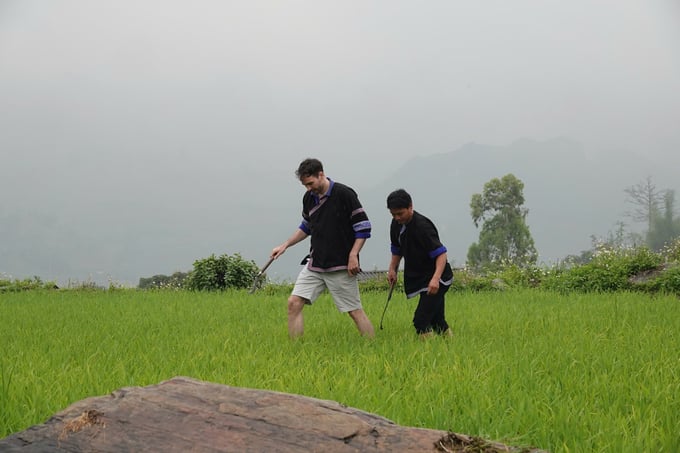
The number of foreign visitors coming to Mu Cang Chai is increasing. Photo: Thanh Tien.
According to Mr. Nong Viet Yen, Secretary of the District Party Committee, Mu Cang Chai is implementing various key initiatives to achieve these goals, focusing on preserving and promoting the unique cultural heritage of ethnic groups, especially the Hmong and Thai cultures. Currently, the district has documented 39 tangible and 142 intangible cultural heritages, with one recognized as a Special National Heritage (the terraced fields), one national historic site (the Khau Pha Guerrilla Force site), and three intangible cultural heritages (Hmong new rice celebration, Hmong flute art, and wax printing patterns on fabric). The district has also developed unique tourism products to attract visitors, transforming heritage into valuable assets.
Mu Cang Chai is prioritizing investments in transportation infrastructure, facilitating easier access to tourist spots. Efforts are underway to attract investments to expand the accommodation sector, with high-quality hotels and resorts that meet international standards. The district currently has 145 accommodations, including 115 homestays, 30 hotels, and resorts, capable of serving over 6,000 guests per day.
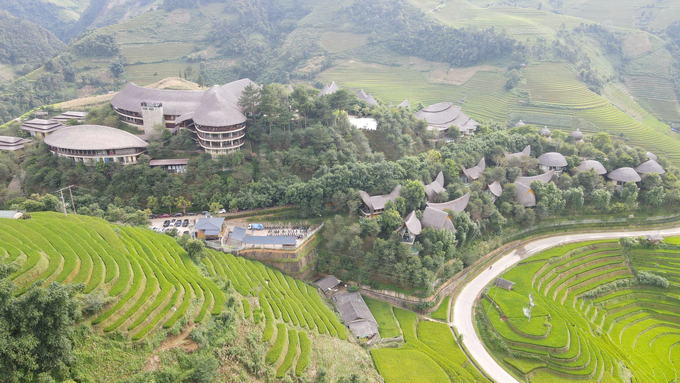
Garrya Mu Cang Chai Resort is the first 5-star resort, establised in September. Photo: Thanh Tien.
In early September 2024, the Garrya Mu Cang Chai Resort was inaugurated, the first 5-star resort here, covering over 6 hectares with 24 mini-villas, 110 guest rooms, a restaurant, and various amenities.
Further large-scale projects are underway, including the La Pan Tan resort area, which has a capacity of 500 guests per day, Mu Cang Chai Ecovillage, with a capacity of 150 guests per day, the Mu Cang Chai wellness resort, and the Mu Cang Chai Legend urban resort in Nam Khat commune, covering 130 hectares with an estimated investment of VND 2.7 trillion, as well as the Ta Cua Y resort area with a projected scale of 450 hectares and an estimated investment of VND 5.7 trillion.
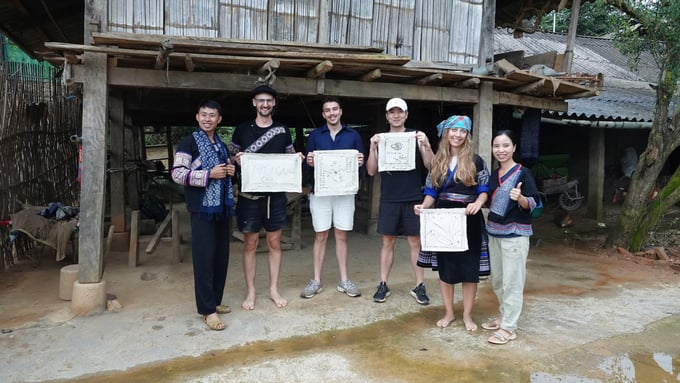
Tour packages in Mu Cang Chai is appealing to the foreigners. Photo: Thanh Tien.
Mu Cang Chai also emphasizes developing unique tourism products, such as cultural tourism with traditional embroidery, brocade weaving, musical instrument crafting, and farming tool forging; culinary tourism, offering ethnic cuisine; and adventure sports tourism, such as climbing Lung Cung peak, paragliding in the scenic area, and the Mu Cang Chai Ultra Trail Marathon.
To enhance the quality of tourism services, the district regularly organizes training programs for tourism-related professions and cultural education to improve workforce quality. Security, environmental hygiene, and sustainability are also prioritized to create a friendly, safe, and civilized tourist environment.
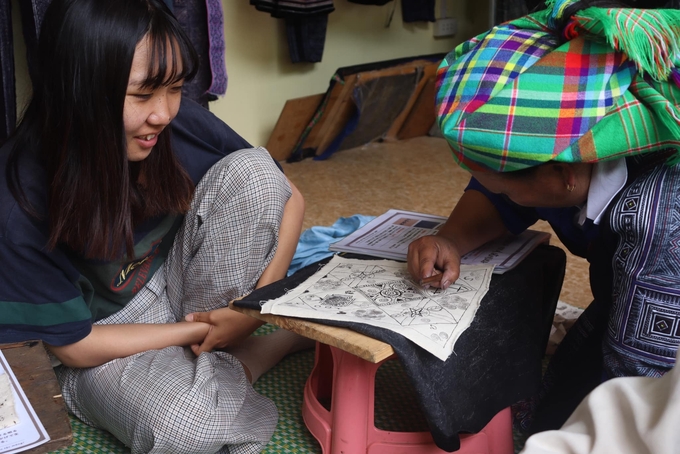
By 2030, Mu Cang Chai aims to welcome 600,000 to 1 million tourists, with 30% being international visitors. Photo: Thanh Tien.
By 2030, Mu Cang Chai aims to welcome 600,000 to 1 million tourists, with 30% being international visitors. The district also implements environmental protection initiatives like planting flowers and trees, improving landscapes, and using eco-friendly materials and energy-efficient products to reduce waste in tourism services.
Translated by Kieu Chi

(VAN) The Department of Agriculture in South Africa has announced the country’s first mass vaccination of poultry to prevent local birds from contracting avian influenza.

(VAN) Establishment of the Mekong Delta Regional Agricultural Linkage Center, aiming for a closed value chain, deep processing, trading platforms, and international market connectivity.

(VAN) Gia Lai province has recently recorded 460 rare species of animals and plants, contributing to forest conservation and biodiversity planning in the region.

(VAN) Ms. Caroline Beresford, New Zealand Ambassador to Vietnam, expressed confidence that agricultural cooperation between Vietnam and New Zealand will develop sustainably, be climate-resilient, and promote gender equality.

(VAN) Vietnam reaffirms its commitment to international cooperation in fostering sustainable and responsible fisheries while ensuring resilient livelihoods for small-scale fishing communities.
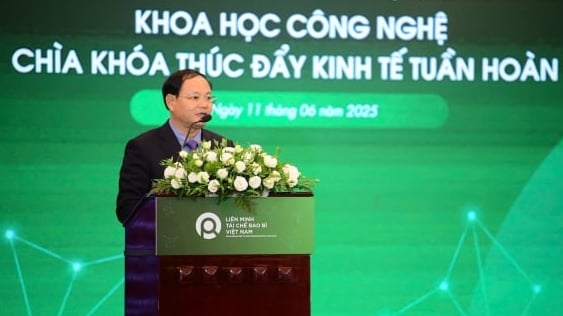
(VAN) More than just a technical solution, science and technology are gradually becoming a cornerstone in Vietnam’s journey toward building a circular economy.
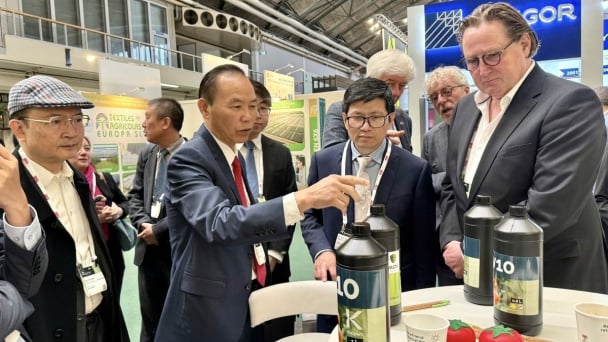
(VAN) The Netherlands is ready to accompany Vietnam in building a green, circular, and sustainable agriculture sector that is resilient to climate change.